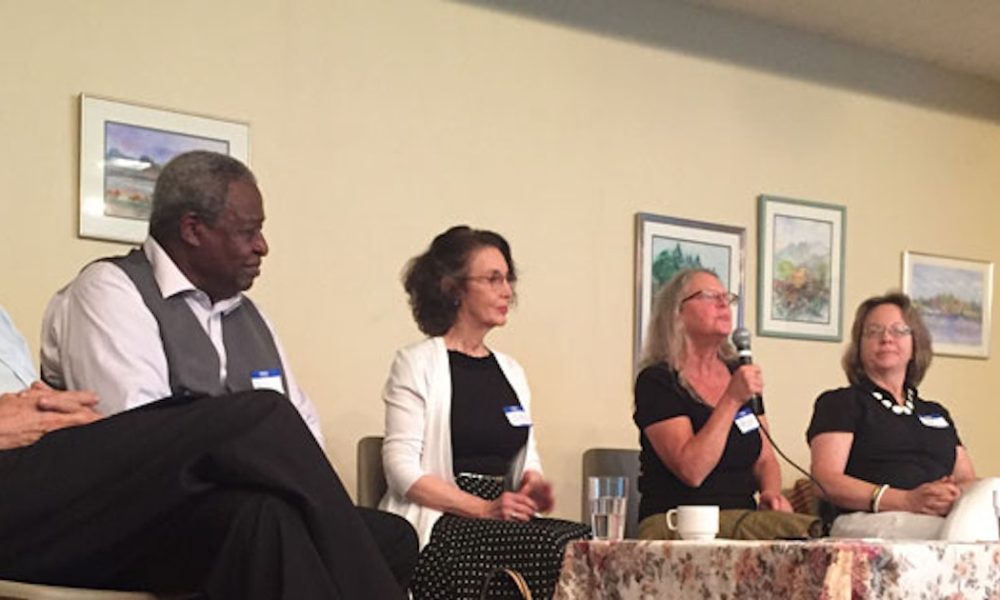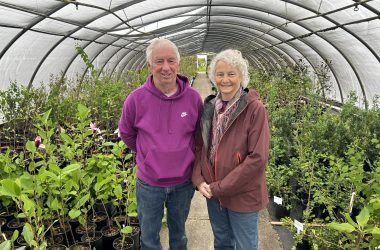 Panel members Pastor Dan Bryant, Bill Harris, Vida Ellins, Lise Colgan and Rabbi Ruhi Rubenstein sit around moderator Leslie Rubinstein (middle) during the panel discussion ”Building a Hate Free Community” on Aug. 22 at the First Presbyterian Church in Cottage Grove. ALIYA HALL/THE CRESWELL CHRONICLE
Panel members Pastor Dan Bryant, Bill Harris, Vida Ellins, Lise Colgan and Rabbi Ruhi Rubenstein sit around moderator Leslie Rubinstein (middle) during the panel discussion ”Building a Hate Free Community” on Aug. 22 at the First Presbyterian Church in Cottage Grove. ALIYA HALL/THE CRESWELL CHRONICLE
The First Presbyterian Church and Cottage Grove Community United joined together to host a community forum in Cottage Grove on Aug. 22 called ”Building a Hate Free Community.”
Bruce Kelsh with the church counted around 110 people at the event that was held from 6:30 p.m. to 8:30 p.m. The panelists were spiritual leaders based throughout Lane County and shared their diverse experience while answering targeted questions.
The panel includes: Rabbi Ruhi Rubenstein, Pastor Dan Bryant, Lise Colgan, Vida Ellins and Bill Harris. Leslie Rubinstein moderated.
”The First Presbyterian and its Earth and Social Justice Committee got involved because we support positive actions that support our community in creating a hate free community,” Kelsh said. ”The event was important because people are seeking ways they can positively impact our community, and are looking for ways they can counter negative and hateful speech and attitudes.”
Rubinstein opened the panel by saying the Cottage Grove community has experienced hateful rhetoric through exclusionary signs and actions. She said after each hate crime, the reaction of the opposition is larger, but the community should strive for knowing the best ways to respond.
The panel was split into three scheduled questions, with room at the end for panelists to address community members’ questions.
The first question asked was, ”What is hate to you? How did you know it was hate, and what was the effect it had on the victim?” Answers ranged from willful ignorance, to a lack of love and spiritual education.
Rubenstein also pointed out that even when hate isn’t deliberate, there are instances when a person is unaware of the hateful intent. She said she has been called into schools before when teenagers would draw swastikas or use anti-semitic rhetoric, and she said they had no idea the effect that they were causing to their Jewish classmates and why there was immediate backlash.
”Even when hate isn’t the motive,” she said, ”That behavior has that intended affect.”
Harris also had an anecdote about hate he experienced. As an African-American who served in the military during the 1960s, he personally endured the effects of segregation.
The second question posed to the panel was, ”What responses have been effective in combating hate?” Ellins said that in Iran the Bahá’í people aren’t allowed to get an education, but they turned it into a positive by creating their own underground institute, and artists have taken on the mission by raising awareness of education discrimination thought the ”Changing the World, One Wall at a Time” campaign.
Bryant recalled a time in 1994 when Temple Beth Israel was attacked by a Neo-nazi who fired ten rounds with an assault rifle into the temple during the week of Passover and Easter. Community members and church leaders held a vigil at the temple to show that the behavior wasn’t acceptable.
”Antisemitism isn’t a Jewish problem, much like racism isn’t an African-American problem,” he said. ”Antisemitism is a Christian problem, we’re responsible for it.”
Colgan said the first thing the community needs to do is show up as a bystander and actively be a witness looking out for potential conflicts; Rubenstein followed up on that, saying that it should be reported to the police, not to the targeted organization.
The third question asked how a bystander can make that move to stand up, and where they can receive further education. Options are available through Bahá’í activities that engage meaningful conversation from a spiritual perspective and presentations from the Earth and Social Justice Committee, like the bystander upstander training.
One of the audience questions touched on Harris’ answers about beating hate with a stronger act of love, and how to use love to overcome hate. While answers varied, the common thread highlighted the importance of personal safety when loving someone who wants to cause harm.
The night concluded with a question asking if the newer generation has become less racist. Although Bryant said he noticed higher acceptance with gender variations, transgender rights and sexual orientation, everyone else agreed on the panel that complacency is dangerous. Harris said that higher expectations have been set but unless there’s a reason for people to change, they won’t.








